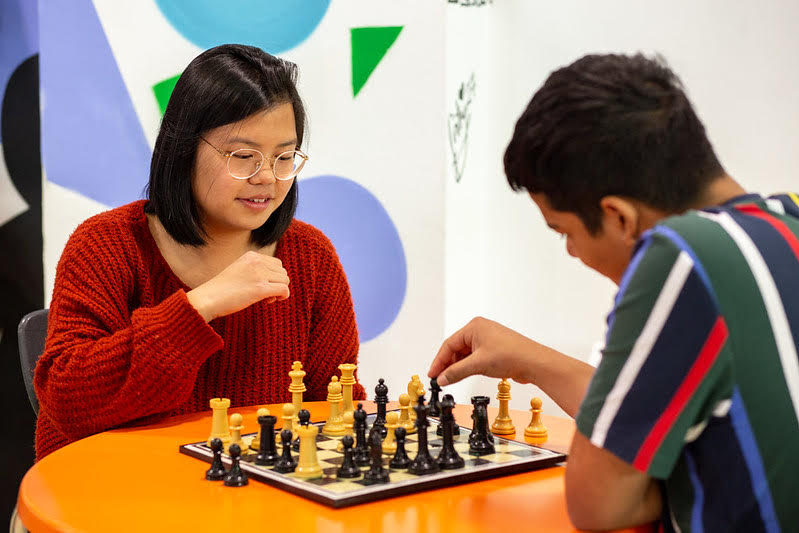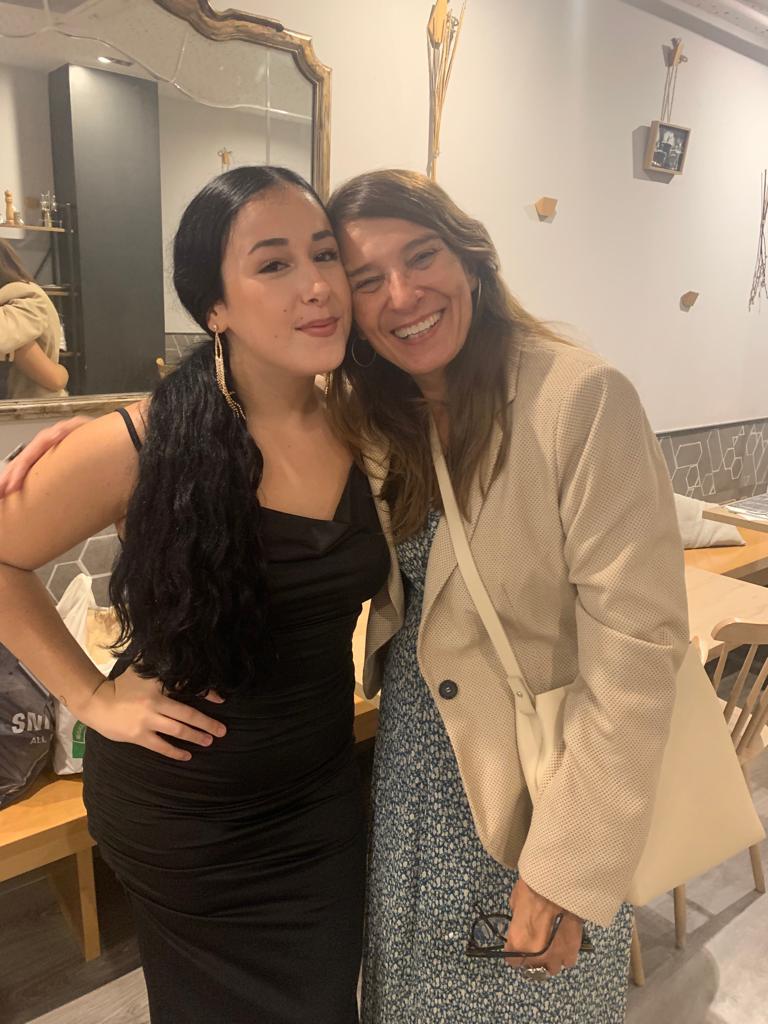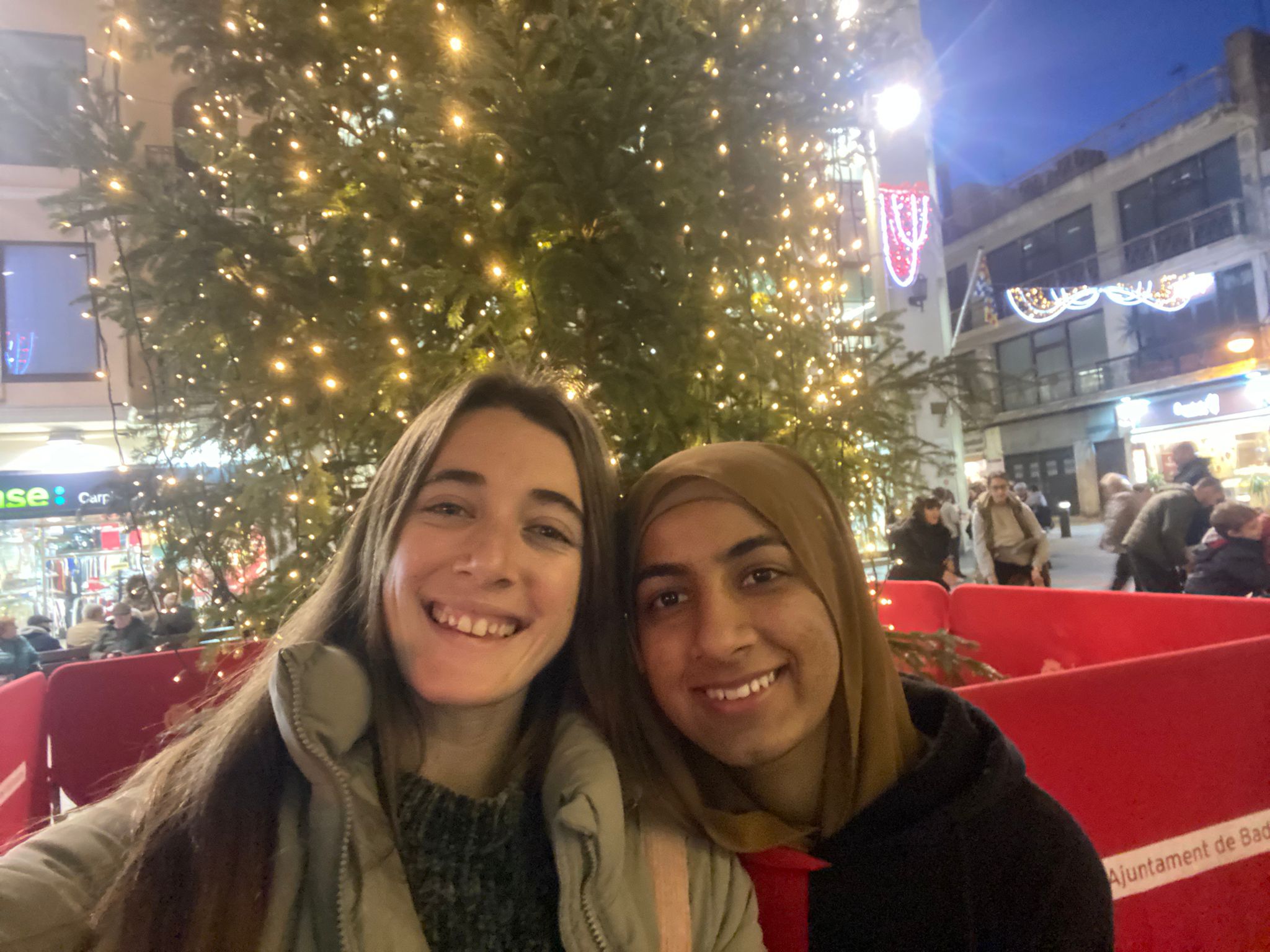“Mentoring is the best thing I have ever done”
03/03/2023

Mentors, mentees and organisations highlight the importance of projects to support vulnerable young people with the aim of improving their personal and academic achievement
On a sheet of paper, several months ago Paola, now 14 years old, wrote that she wanted to be more open and less shy. She was going through a complicated personal time and her school encouraged her to register for a mentoring project that would provide her with support over the course of one year. What they told her was simple: she would meet a young person, slightly older than her, who would act as her confidant and advisor. Patricia, 23 and a student of Social Education, came into her life. “I wanted to be a volunteer with teenagers because I have a keen interest in this period of change, of imagining and suffering, of having an opinion but feeling ignored”, she says.
The awkwardness of the first day made way for long conversations about their lives and the issues that matter to them while strolling by the Arc de Triomf area. “Some people think a mentor is someone who helps with your homework, but it isn’t the case. A mentor is also not exactly a friend, either. It is someone you can confide in, someone who listens to you, helps you and gives you advice”, Paola sums up. They say that the age difference does not matter and they are grateful that the project has allowed them to meet. “Patricia has enabled me to see that there are many lives in this world and not everything revolves around us”, Paola says, adding that the perspective offered by her mentor – which is a bit more grown up than that of her friends – has “opened her eyes” to new realities and perspectives. It has also allowed her to “connect better” with her parents and other relatives. Patricia has learnt a lot from her mentee as well: “She’s a very mature girl for her age”, she states.
“Some people think a mentor is someone who helps with your homework, but it isn’t the case. A mentor is also not exactly a friend, either. It is someone you can confide in, someone who listens to you, helps you and gives you advice.”
Patricia and Paola are one of the mentoring pairs who met through the Rossinyol project, managed by the Fundació Camins in Barcelona. The organisation has spent more than a decade working to bring young people suffering social difficulties together with volunteer vocational training or university students who want to help them. With the support of schools, it identifies students who “spend a lot of time on their own” and “don’t benefit from constant attention from their families”, Clara Artús, project coordinator, explains. “This form of care is highly personalised: mentoring involves taking someone by the hand and being with that person. We do not teach anything specifically, rather it is about being there, offering support”, she asserts. The aim is not really for them to improve on their school performance; instead, it is to offer them a positive point of reference and to guide them emotionally. “The appraisals we receive suggest that those who take part gain more trust, feel more supported, develop their self-esteem and become more empowered with their education”, Artús summarises.
Related: MENTORA, a new programme for all young people to stay in education
The Rossinyol project has extended quickly throughout Catalonia. In the counties of Tarragona it is managed by the organisation Quilòmetre Zero and some 80 pairs take part from the various local parishes. “We were working with a primary school through a welfare initiative, but we wanted to deliver an alternative support project in order to go further and to reduce the inequalities that have become greater since the recession in 2008”, Marina Claverías, director of the organisation, explains. Then the organisation found out about the Rossinyol mentoring project which was in the early stages of being implemented in Girona at the time. Following intensive training for all the professionals at the organisation, the project was adapted to suit the circumstances of the Tarragona region. Although not instantaneously, the outcomes eventually shine through. “The boys and girls taking part gain better interpersonal skills and communicative abilities, they strengthen their social network and find out more about their area, which they do not do with their families. If a child who has never been to the beach or the theatre simply does so due to the project, it has already been worthwhile”, Claverías affirms.
Suitable financing
However, for everything to unfold smoothly, an excellent technical team, adequate assessment and good funding are necessary. Although the mentors are unpaid volunteers (to some extent, this is the magic of the project because pupils value the fact that young people want to support them and that they don’t do it for money), the organisations do require funding, at least to cover the cost of their activities. “It is difficult for us to try to explain that there are costs involved even with a volunteer-based project, but quality depends on funding, because ensuring that people are prepared and trained gives projects a great deal of added value, while funding is also needed to pay for the activities the pairs do”, Claverías states. Some go to the cinema, a concert or the theatre, others have a snack, go climbing or practice sport.

Image: Solange and Judith
Solange, 59, and Judith, 16, have been to the cinema, to a Rosario concert and taken a stroll around El Raval. They are one of the 60 pairs who have been brought together through the Mòdum project, promoted by El Raval’s Comprehensive Education Association (AEI, from the Catalan) over the past three years to strive for the academic achievement of young people at risk of social exclusion. With this letter of promotion, Judith believed that the mentor would prepare her “a homework schedule”, but she has found in her mentor more than a remedial tutor. “We get along amazingly and I now see her almost as one of the family. When my world is caving in, she is a help button”, she explains confidently. Judith speaks wonders about her relationship with her mentor. Partly thanks to Solange, she says, she has overcome a period of anxiety and depression: “I tell her about my problems and it feels like a safe space where I am not judged”. “Mentoring has been the best thing I’ve ever done”, Judith declares. Solange says that meeting Judith has even changed her relationship with her own children. “I look at them with a different insistence, with more empathy and perhaps view them as more fragile”, she says, aware of the delicate nature of the teenage years. “It has offered me a new perspective: I was a worker, a woman, a mother and now I am also a mentor, which means helping by offering company”, she asserts. Both are certain that their relationship will go beyond the time limits of the project. Indeed, Solange sums up by stating: “Judith has come into my life and my heart”.
“Beyond passing a school year, we help students to make decisions.”
The Mòdum project is particularly aimed at students in the 4th year of compulsory secondary education and in the 2nd year of upper secondary level, going through changes in their stage of education that will have a big impact on their life course. Sara Desiree Ruiz, social educator and programme coordinator, explains how they opted for mentoring and not for another type of scheme because this method offers “stability, learning and support”, which other services do not. Even though the ultimate aim is to deliver academic achievement, Ruiz accepts that this goes far beyond academic outcomes: “We want adolescents to build a life project, to learn how to handle their emotions, to be more aware of the resources they possess and to discover what educational and employment opportunities they have. Beyond passing a school year, we help students to make decisions”. In any event, the outcomes prove very obvious: whether it is young people who are confused when they come to us and who go on to enrol for a training programme or others who feel lost and end up gaining trust and confidence.
Academic achievement and personal success
This combination of measurable outcomes (grades at school) and less measurable ones (personal satisfaction) is also the goal of the Zing mentoring project, promoted by the Fundació Nous Cims, which aims to get young people to find out their vocation, to secure scholarships for them and to enable them to find a quality job. According to Víctor González, project coordinator, one of the aims of the programme is to ensure the academic achievement of the mentees, and this means them passing more than 60% of subjects and moving on to the next school year, and in 92% of cases this is attained. However, aside from academic outcomes, the essence of the project lies in strengthening the emotional wellbeing of participants: most point out that mentoring has boosted their motivation to study, raised their level of self-esteem, increased their curiosity to learn new things, enhanced their ability to make future decisions and encouraged them to communicate more with others. Another aim of the project is to prevent radicalisms because bringing varying realities together, they assert, is an excellent way of “fighting stigma and prejudice.”

Image: Elsa and Zalaikha
One of the 100 young mentees taking part in the Zing project is Zalaikha, 19, from Santa Coloma de Gramenet who is studying to be a nursing assistant. She joined “to talk to someone about anything” and even she did not expect it to turn out so well. “I’ve learnt to trust myself”, she says. For Elsa, the mentor, the experience is also “amazing” because it has helped her to be more open and “embrace diversity”. A 25-year-old journalist, Elsa had long considered social volunteering to “help young people in some way”. “I am forming a bond with a person who I would more than likely have never met. Despite having different cultures and traditions, we are building a connection and we have developed a very strong affinity”, she explains. She has even met the family of her mentee.
“I am forming a bond with a person who I would more than likely have never met.”
The key to the success of mentoring projects, according to the coordinators we asked, is a combination of several factors: good funding, an atmosphere of trust, excellent in-depth coordination with social services, schools and other stakeholders, and a great technical team to “guide and supervise” relations. “It is sometimes said that mentoring is a relationship between two, but it needs to be a three-way one to work, involving the mentor, the mentee and the supporting organisation”, as summed up by Laura Terradas, programme coordinator for Punt de Referència, the benchmark organisation in the sector inasmuch as it is the pioneer. Punt de Referència has been promoting mentoring projects for 25 years (Referents, for support with access to the labour market; and Atenea, focussed more on education), always centred on supporting young people between 16 and 23 years of age under guardianship, formerly under guardianship or without someone to look up to in Catalonia during their emancipation process. They identified the fact that one of the greatest difficulties this group faces is loneliness. “One of the vital organs we all possess is our social network. Having people to look up to and company is essential because it helps you to stay motivated, deal with everyday challenges and improve your self-confidence”, Terradas asserts.
Both Punt de Referència and the organisation AEI Raval are looking for mentors over the age of 30 years to ensure they can offer a certain amount of experience and stability. Teresa and Ahmed met only two months ago, although given the trust they have no one would ever guess. “I thought I could help someone by spending some of my week with them”, she says adamantly. They have visited La Pedrera, the Miró Foundation, libraries, museums and community centres; they have strolled around Eixample and Gràcia districts; and they have told each other about their lives. Through his meetings and conversations with Teresa, Ahmed has learnt “to respect the people and many other things from Barcelona he was unaware of”. He came to Spain from his country, Guinea, two years ago when he was 17, and he is now studying an intermediate course in Climate Control. A year ago “I wasn’t focussed” and a friend told him about Punt de Referència. “He told me that they used to help him with his education and used to teach him things he didn’t know”, he recalls. And, seeing how the project had improved his friend’s life, he decided not to give it a second though and he asked for a mentor. This was how he met Teresa. “She is a very important person for me. She helps me come up with bright ideas; she gives me advice on my education and my life in general. She doesn’t really help me with my homework; rather, she gives me ideas to pass my subjects”, Ahmed states. He says he wants to tell his story in case any young person who needs to might be encouraged to take part in a mentoring project. He affirms that it has changed his life: “I now have a clearer vision about what I should and shouldn’t do”.
International projectsMany organisations that deliver mentoring projects addressed to vulnerable groups are organised under the umbrella of the Social Mentoring Network. In all there are 20 organisations, most of which are established in Catalonia. However, outside Catalonia there are many international experiences that may serve as points of reference for mentoring. Rotterdam is the second largest city in The Netherlands and it is also where the working class are poorer. In this context, the organisation Mentoren op Zuid strives to take primary and secondary students living in the most vulnerable neighbourhoods – and who lack emotional and academic support – and “lift them out of their bubble”. In the past year, almost 1,500 young people have benefitted from the project, focussed essentially on preventing school dropout. According to Sezgin Yilgin, programme director at the organisation, they have centred specifically on this issue because not benefitting from a setting that is conducive to study leads to “huge inequalities in opportunities”. “This makes all the difference: the boys and girls see that the mentors are truly interested in them; they feel that they really matter to someone, and that it isn’t about money.” There are other organisations, such as Mentor Latvia, that do not have such a specific niche as students at risk of school failure. “We offer practical and emotional support to young people aged 13 to 19 years who do not have someone to rely on because their parents have lost custody or have passed away, for instance”, Ulla Zumente-Steele, programme manager at the organisation, explains. They select and train the mentors specifically to ensure they are in a position to form a relationship of trust over a period of at least one year with the mentees to allow the latter to achieve “practical skills for life, such as cooking or developing healthy habits”, as well as “emotional” skills, such as improving their self-confidence. Indeed, this is where one of the basic essences of the programme lies: the fact that the mentors are volunteers. “This makes all the difference: the boys and girls see that the mentors are truly interested in them; they feel that they really matter to someone, and that it isn’t about money”, Zumente-Steele declares. Thousands of miles from Latvia, another organisation is also working every day to enable university students in the region to become “socially and emotionally strong”, to ensure their “emotional, social and school wellbeing” and to boost their educational hopes and their self-esteem. In India, the organisation Mentor Together embarked on a journey to address three needs it had identified: shortcomings in the abilities of university students to perform 21st century jobs; limited access to employment opportunities; and, restrictive gender-based social rules, imposed by the students’ families themselves. “Our mentoring pairs focus on improving mentees’ job skills, such as the ability to make professional decisions or to handle one’s emotions”, says Jean Paul Boddu, associate director and programme leader at Mentor Together. The outcomes are a testament to the experience: 94% of mentees believe that their learning-based and social capacity has improved in the wake of the programme; 77% give a higher rating for their ability to make decisions about their academic pathway after their mentoring compared to before; and 68% believe that their social and occupational intellect is greater following the programme. |
For further information:
- Are you familiar with the MENTORA programme?
- Read the news item on the presentation of the new mentoring programme: Mentora, a new programme for all young people to stay in education
- Read the article Catalonia, a land of mentoring to enable educational transitions
- Read the monograph Mentoring, to enable all students to remain in education
Image: set of images of young people (Catalan Agency for Young People).